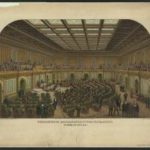Students will consider the arguments made by members of the Continental Congress regarding whether or not to sign the Declaration of Independence. They will also have the opportunity to analyze each section of the Declaration to understand its meaning and consider the consequences of signing the document.
The U.S. Constitution: Continuity and Change in the Governing of the United States

This unit examines continuity and change in the governing of the United States. Lessons one and two are focused on a study of the Constitution and Bill of Rights and provide access to primary source documents from the Library of Congress. Lesson three investigates important issues which confronted the first Congress and has students examine current congressional debate over similar issues. Lesson four features broadsides from the Continental Congress.
James Madison in the 1780s

This short video explores the impact of James Madison’s experiences in both the Continental Congress and the Virginia House of Delegates in shaping his views of government. Madison understood the nature of collective deliberation and the Constitution reflects his interest in and understanding of the legislative process. Professor Jack Rakove examines Madison’s concerns about the “passions and interests” of both citizens and legislative bodies.
Who Were the Foremothers of the Women’s Suffrage and Equality Movements?
This lesson looks at the women’s suffrage movement that grew out of the failing of the Continental Congress by “remembering the ladies” who are too often overlooked when teaching about the “foremothers” of the movements for suffrage and women’s equality in U.S. history. Grounded in the critical inquiry question “Who’s missing?” and in the interest of bringing more perspectives to whom the suffrage movement included, this resource will help to ensure that students learn about some of the lesser-known activists who, like Elizabeth Cady Stanton, Lucretia Mott, and Susan B. Anthony, participated in the formative years of the women’s rights movement.
Documents and Debates in American History and Government – Vol. 1, 1493-1865
The Core Documents Collection – Documents and Debates is structured around a series of topics, each based on a question for debate. For each topic, there is a collection of documents that, together, form the basis of argument over that topic – from those who debated it at a given point in American history. Volume One covers 1493-1865, and Volume Two covers 1865-2009.
The goal is to explore a series of critical moments in American history by asking questions for which there are not simple yes/no answers, but instead call for informed discussion and rational debate. The Documents and Debates readers also include appendices of additional documents, and together are a perfect fit for any American History survey course, including AP U.S. History.